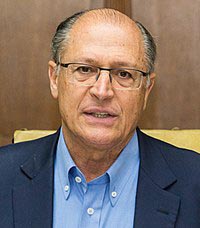BRASILIA (Reuters) – The centrist Brazilian Social Democracy Party, or PSDB, elected four-time Sao Paulo Governor Geraldo Alckmin as its leader on Saturday, making him its most likely presidential nominee in next year’s elections.
Alckmin threw the party’s weight behind a social security overhaul that is currently before Congress and would cut generous pensions for public-sector employees.
“Pension reform is necessary so that we do not have two classes of Brazilian citizens,” he told the convention, which elected him by a 470-3 vote.
Alckmin said former leftist president Luiz Inacio Lula da Silva, a likely rival in the 2018 race, had led Brazil into its worst recession and biggest corruption scandal.
“Lula wants to return to the scene of the crime,” he told cheering supporters. “Be sure, we will defeat him at the polls.”
Alckmin was picked to unite a divided party, with both supporters and opponents of Brazil’s unpopular President Michel Temer. He plans to complete the PSDB’s withdrawal from the governing coalition.
But Alckmin made it clear the PSDB would back Temer’s pension proposal, which investors consider crucial for closing a huge budget deficit that cost Latin America’s largest economy its investment-grade credit rating.
With elections less than a year away, PSDB lawmakers want to distance themselves from Temer. Half of its 46 congressmen did not back him when the lower house voted in August to block corruption charges against him.
Alckmin must overcome the party’s own brush with Brazil’s ongoing political corruption scandal. He succeeds Senator Aecio Neves, the party’s defeated 2014 presidential candidate who is under investigation for allegedly asking jailed Joesley Batista, owner of meatpacker JBS SA for 2 million reais ($607,500) in illegal funding. Neves was booed and quickly left the convention after casting his vote.
The PSDB’s disengagement from the Temer administration was almost completed on Friday with the resignation of Antonio Imbassahy, the president’s minister of political affairs.
Alckmin, 65, was governor of Brazil’s richest and most populous state from 2001-2006 and again from 2011 to now. He ran for president in 2006 but lost to Lula, who is still Brazil’s most popular politician despite a corruption conviction that could bar him from running or even land him in prison.
Former Brazilian President and PSDB founder Fernando Henrique Cardoso, who won two elections against Lula, said it was better to defeat him at the polls than to put him in jail.





